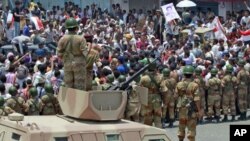Yemen's opposition rejected on Monday a Gulf Arab initiative for President Ali Abdullah Saleh to step down because the proposal appears to offer him immunity from prosecution, while Saleh himself welcomed the Gulf plan.
Anti-government protests continued across Yemen Monday, despite the acceptance by President Ali Abdullah Saleh of a Gulf Cooperation Council proposal to put an end to weeks of popular unrest.
A statement from President Saleh’s office indicated that he had agreed to a "peaceful" and "constitutional" transfer of power to his vice-president Abdrabuh Hadi Mansur.
The six-nation GCC did not specify a time frame for the power transfer, however, and the statement from Saleh appears to indicate that he agrees to transfer power after the next elections in 2013.
GCC Secretary General Abdel Latif Zayati insisted that the group's proposal was in Yemen’s best interest. He said in the GCC proposal power will be transferred peacefully and securely, preventing Yemen from falling into chaos and violence, with the framework of a national agreement.
Yemen Post newspaper Editor-in-Chief Hakim Almasmari, however, insisted that Yemeni protesters are not happy with the GCC proposal because it allows President Saleh to remain in the country.
"We're seeing refusal and rejection from all sides in Yemen opposing the Saleh regime, because this initiative does not clearly say that Saleh steps down," said Almasmari. "If Saleh stays in power, even though he transfers his power to the vice-president, he will still be the most powerful person in the country. He owns the institutions, the businesses, the companies, the banks. The heads of all the institutions in Yemen are loyal to him and not the vice president making this a failure before it even starts."
Meanwhile, Syrian security forces have broken up a student demonstration at Damascus University in support of anti-government protesters. Activists reported several arrests.
Syrian army troops were deployed in the port city of Banias early Monday in an apparent bid to quell bloody clashes over the weekend. Al Jazeera TV claimed that the government cut electricity to the city as part of measures to put down public unrest.
In Bahrain, a top human rights activist was interrogated by military prosecutors Monday over allegations of tampering with photos of prisoners allegedly beaten in government custody. At least several Shi’ite protesters have died after being arrested and held by the country’s Sunni Muslim rulers.




